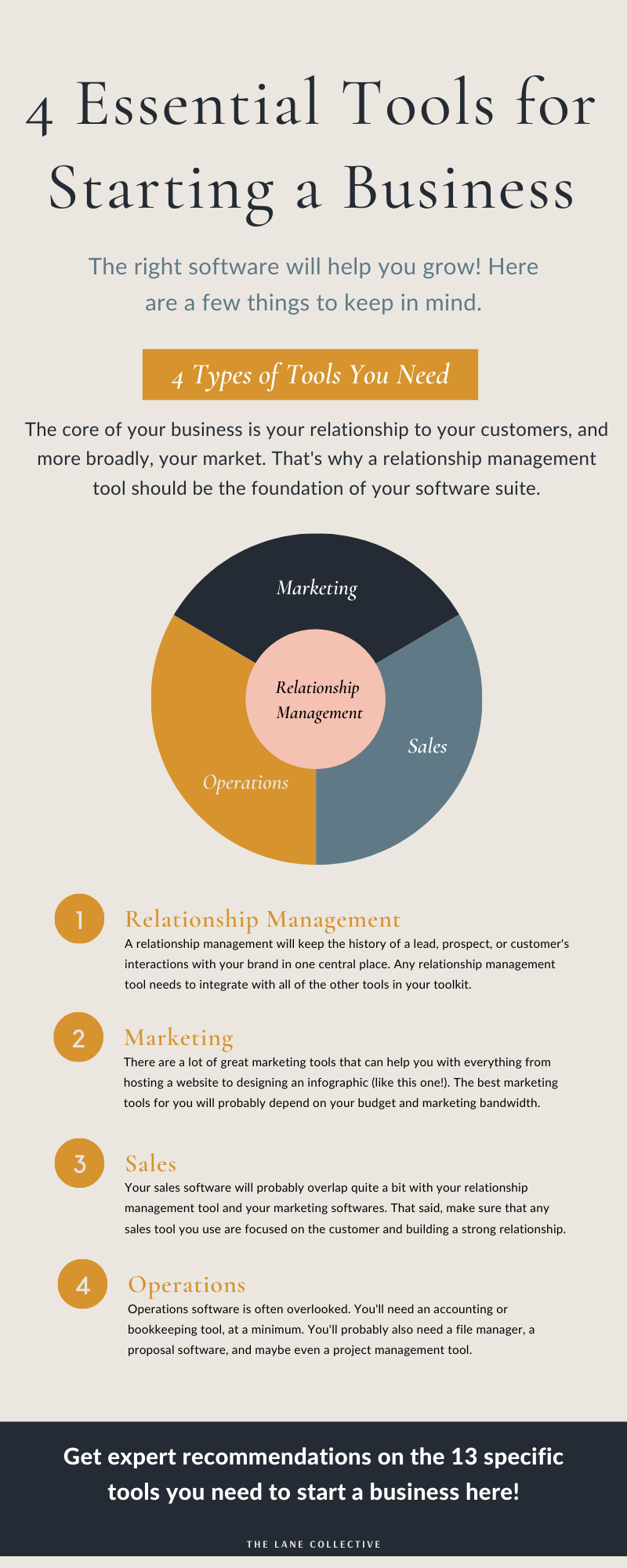4 Tools Every Software Toolkit Needs to Include (Infographic)
Launching a successful business in 2020 requires a strong technology foundation. If you’re not sure where to start, start here. You’ll learn the four types of tools every business needs to succeed, plus tips for how to evaluate your options.
If you’re starting a business, you probably already know you need a website. But what about everything else?
In this blog, you’ll learn the four types of tools you need to create a strong foundation for success.
This blog is designed to teach you how to think about your new business’s software suite (teach a man to fish, right?).
If you’re looking for specific recommendations for the detailed categories of software, I’ve got you covered. Click here to read a blog dives deep into the 13 different tools you’ll need, including my personal, researched recommendations.
But before you get to the specifics, it’s important to know the different types of technology your new business needs. That’s what this blog is for. Let’s get to it.
The 4 types of technology every new business needs:
In general, here are the four categories of tools you need:
Relationship Management
Marketing
Sales
Operations
Remember, the core of your business is your relationships with your leads, prospects, and customers, and more broadly, your market.
To reflect this reality, it’s important that your relationship management software is also the foundation for the rest of your technology tools. In practical terms, that means that 1. Every other tool should integrate with your relationship management software, and 2. That your relationship management software is your “system of record.”
Here is an infographic that explains this relationship:
And here is a little more detail:
Relationship Management
A relationship management will keep the history of a lead, prospect, or customer's interactions with your brand in one central place. Any relationship management tool needs to integrate with all of the other tools in your toolkit.
If you don’t have any technology in place, start by finding a strong CRM for your business. This CRM should integrate with your website and any other tools that you may already have, like email.
Marketing
There are a lot of great marketing tools that can help you with everything from hosting a website to designing an infographic like the one above.
The best marketing tools for you will probably depend on your budget and marketing bandwidth. All of them, as you’d probably expect, are very well marketed. To sort through all of the sales talk, I’d highly recommend talking to your peers or checking out recommendations online.
Want my recommendations for the best marketing tools for small businesses and startups? Get them all here.
Sales
Your sales software will probably overlap quite a bit with your relationship management tool and your marketing softwares. That said, make sure that any sales tool you use are focused on the customer and building a strong relationship.
The goal of any sales software is to optimize the sales process; that is, you want it to be painless for the customer and achievable for your sales people. Keeping this in mind will go a long way towards finding the right tool for you.
Operations
Operations software is often overlooked, particularly early on in your business. That said, unless you love complicated taxes and legal headaches, it’s a good idea to find the right operations tools for your business.
You'll need an accounting or bookkeeping tool, at a minimum. You'll probably also need a file manager, a proposal software, and maybe even a project management tool.
Additional Notes
Some people might bundle marketing and sales, but I think they’re different enough in the early stages of building a business to keep them separate.
Likewise, you won’t find any development software or tools, as those are going to be very specific to your business and your product.
Finally, you may question why there is no separate “customer success” software here. That’s because I see “customer success” as part of relationship management; that is, it is the foundation for the rest of the business, and should be at the core of any technology toolkit.
Now that you know the four key categories of software tools, you’re ready for details about the 13 specific types of tools you need.
Luckily for you, all of that information is in one place: here’s an entire blog on the 13 technologies you’ll need to start your business.
When you’re ready, you may also be interested in our complete list of technology recommendations for startups and small business. You can get that list of recommendations for free here:

